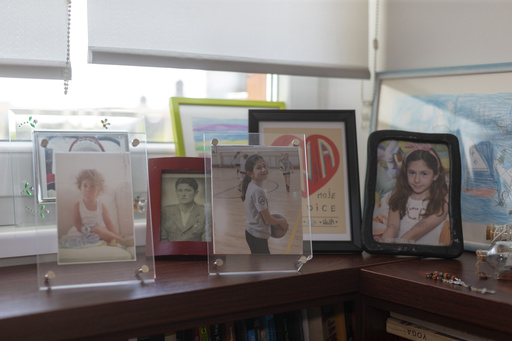BELGRADE, Serbia (AP) — Ninela Radicevic still can’t comprehend that her daughter is never coming back.
The 11-year-old Ana Bozovic had just arrived to her school in central Belgrade last year when another pupil, 13 at the time, came in and opened fire at anyone standing in his way.
Bozovic, two other girls and a school guard were killed immediately in the corridor. The teenage shooter then went on to a nearby classroom and turned his gun on the pupils and the teacher inside.
A total of 10 people were killed. Eight children and a school guard died, and seven people were wounded at the school on the morning of May 3, 2023. One of the wounded, a child, died from injuries later.
The shooting stunned Serbia. The Balkan nation was no stranger to violent crime, but mass shootings are rare and one hadn’t taken place at a school before.
Further shock followed just a day later, when a 20-year-old man went on a shooting rampage outside the capital. He killed nine and wounded 12 others, mostly young people.
For Radicevic time stopped on the morning she lost her little girl. She believes the entire country too had to grind to a halt after such an unthinkable crime. Instead, she told The Associated Press, “everyone rushed to forget.”
Her eyes torn with grief, Radicevic spoke to the AP at the family home in Belgrade. Photos by her side show a wide-eyed girl with long brown hair, who loved sports and dancing, and kept medals from competitions above her bed.
“We forget tragic events too quickly,” Radicevic said. “This habit of pushing everything under the carpet has to end.”
People, she said, “had to recognize the importance and the tragedy of that moment.”
Bozovic’s room in the apartment remains intact — a world map is hanging on the wall and her stuffed animal toys are on the bed. A huge framed photo poster of her standing upside down in her judo outfit fills the room. The desk is still as she left it, paper drawings and messages are hanging from the wall.
Radicevic, a 49-year-old clinical researcher, has led an effort to keep the memory alive of all the children killed in Belgrade’s Vladislav Ribnikar school and the two villages near the capital, so something like that won’t happen again.
“All we (parents) have been doing is fighting to make sure that May 3rd is not forgotten, to give some meaning to our children’s sacrifice,” said Radicevic, who also has a 17-year-old son. “They are the victims. But victims of what?”
Many in Serbia have been asking the same question before the grim anniversary on Friday that will be marked with an all-day commemoration ceremony near the school, including art installations, discussions with experts and video films about the victims.
The program is dubbed “Awakening,” an apparent call for self-reckoning and introspection in a nation that is yet to come to terms with its role in multiple wars in the 1990s and the culture of violence that has prevailed ever since.
The slain children’s parents have been closely involved in the preparations. They have fought to have the school closed and turned into a memorial center, organized protests and remembrance events, and testified about their ordeal to promote awareness among the public.
“The fact that children returned to that same school only a week later, also on a Wednesday, for the same set of classes, tells you that the state wanted to quickly create a sense of normalcy,” Radicevic said.
“What had to happen is that Serbia had to stop that May 3rd regardless of the state support,” she insisted. “We had to stop, to think, to find out what we had done wrong, to say OK, we have made mistakes, let’s accept it and see how we continue from tomorrow, how this society will get better.”
Serbia’s populist government launched a gun crackdown, collecting about 80,000 weapons and rounds of ammunition. State-backed support teams offered counseling, and police officers were deployed outside Serbia’s schools for security.
The shooters were both apprehended. The teenage boy’s parents went on trial, charged with teaching their underage son to shoot and for not securing the weapons at the family home.
The trial against the village shooter and his father has yet to start in May in the central town of Smederevo, more than a year after the massacres in Malo Orasje and Dubona that left the two villages paralyzed with mourning and sadness.
Shock and anger because of the shootings last year triggered months of street protests demanding resignations of top officials and a ban on mainstream media that spew hate speech and intolerance. A year later, critics say not much has changed.
Psychology professor Dragan Popadic, however, believes it has. The trauma, he said, created a sense of fear and insecurity that hadn’t been there in the past and prompted activism. But people aren’t ready for a more radical insight, Popadic added.
“These cases of violence are only tips of an organism that was born in the 1990s and which has grown and strengthened,” he said. “Until we deal with the organism itself … we won’t be able to comprehend the situation we are in.”
Radicevic said Serbia missed a “last chance for a catharsis.” Most people were just relieved that “it wasn’t mine (their child)” and moved on, she said.
“A week later other children went to see where it (shooting) had happened,” she said. “I am sorry, but I think that is not normal.”


